JOHN ENDERS' TRIP AROUND THE WORLD
IN 39 MONTHS COURTESY OF THE USAAC
SEPTEMBER 25, 1942 – DECEMBER 24, 1945
BY TRAIN, PLANE, SHIP, BUS AND CAR
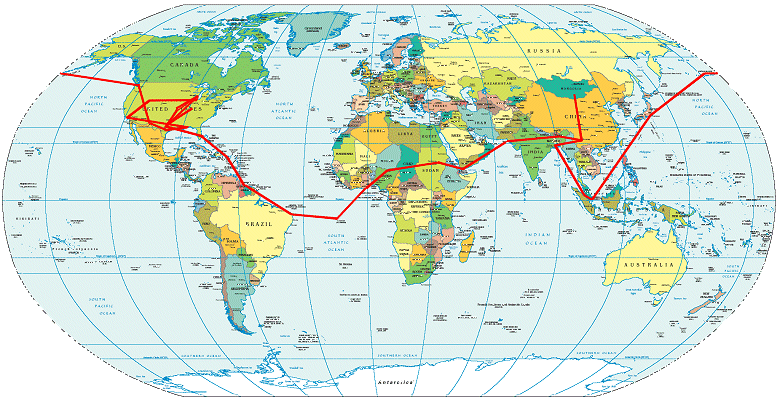
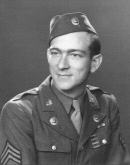 John C. Enders (1918-2008) tells of his memories after he enlisted in the United States Army Air Corps at age 26 in
John C. Enders (1918-2008) tells of his memories after he enlisted in the United States Army Air Corps at age 26 in
San Antonio, Texas
on September 25, 1942. He was sent to Ft. Sam Houston Induction Center for one week, then to Kelly Field as an aircraft mechanic.

Barracks at Kelly Field
|
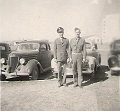
Kelley and John
|
From San Antonio, using transportation via the railroads he was sent to
Gulfport, Mississippi
March 4, 1943 for aircraft school.

|
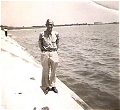
| |
His wife Helen came to visit him for Easter weekend
|
then to
Los Angeles, California
in June 1943, for specialty aircraft school

Leaving Burbank, California
Then he was sent to
Salt Lake City, Utah
August 1943 for rifle training
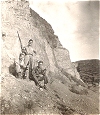
Benson, Abels, Enders
|
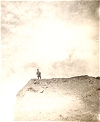
John
|
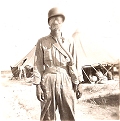
John in Gas Mask Training
|
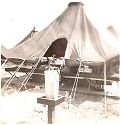
A Troop Tent
|
He was then transferred to
Milwaukee, Wisconsin
For distribution. While awaiting orders for his next assignment, he got a 2-week furlough and went home to
Austin, Texas
then it was back to
Milwaukee, WS
for a day or two, then transferred to
Kansas City, Kansas
in October 1943 for 2 months
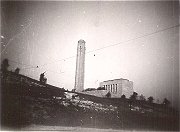
|
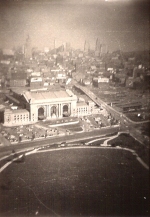
|
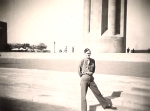
| |
Sightseeing in Kansas City at the Liberty Memorial to WWI veterans
|
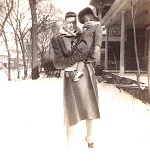
His wife and daughter Carolyn
join him in KC for their first snow
|
Austin, Texas
He got 4 weeks off at Christmastime 1943, and then was assigned to
Memphis, Tennessee
for 5 months. He finally found a place for his family to live. There was a shortage of living quarters and restrictions on children. He ordered a rental baby bed and sent for his family. They arrived and lived there for several weeks. He received his orders to ship out and when the baby bed finally arrived, he told them to take it back!
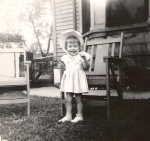
Carolyn celebrates
2nd birthday in Memphis.
|
He was to ship out to Homestead, FLA but there was a 10 day delay so he took the first train with his wife and daughter back home to
Austin, Texas
Homestead, Florida
In Homestead he was assigned to a C-46 maintenance crew. They took the plane out for flight readiness. They had no problems with it. While checking out riding in the belly of the plane, he experienced his first down-draft over Key West, vividly remembering it 60 years later. With the final destination as India and the China-Burma-India theater, they left Homestead on June 21, 1944 on their way to
San Juan, Puerto Rico
At each fueling stop along the way, they would spend the night. Second day they flew to
Georgetown, Guyana
then on to
Natal, Brazil
Upon landing, they experienced some problems with the brakes on the plane but they could not find the source of the problem. It was determined that the plane was safe for travel to the next stop.
It was while they were layed over in Brazil that John bought a little monkey. It was cute but wild and a source of entertainment for the crew. He had his own cage in the aircraft.
On an otherwise non-eventful trip, with everyone on board asleep, the current tanks ran out of fuel, the engines backfired and started a steep descent. The pilot reached down and opened new tanks of fuel and they began a smooth ascent, leaving some jittery nerves. The navigator also discovered at that time that they were 65 miles off course. If they'd crashed, no one would have been able to find a trace of them. Next day to
Ascension Island
The Ascension Island was a big rock owned by the Brits. The Americans and Brits blew the top off to make a runway. It was a unique runway in that you landed going up and then went down the other side before stopping. Looking over the edge of both ends, you could see shells of airplanes that didn't make it The brakes caused concern for the crew again and they spent 2 to 3 days there trying to figure out what to do about the brake problem. The next nightly stops were
Accra, Ghana,
When they reached the next scheduled stop, the crew took off to get some food. While gone, the ground crew at the airfield sprayed the interior of the airplane, not knowing there was anything alive onboard, and killed the little monkey.
Kano, Nigeria,
Khartoum, Sudan,
Misamari, India
There he stayed for about 6 months at the western base of the Himalayas. The brake problem persisted on his plane and on one of it's flights, it ran off a runway and crashed the nose. John was not on that flight, having drawn KP duty that day, but it left him a "man without a plane." With that he was transferred to
Chenkung, China
as part of the ground crew. He arrived there in the Winter of 1944 and it was to be home for 12 months until the end of the War.
Chenkung was an airfield about 17 miles south of Kunming and a mile or two from a small town. The town had a wall around it which was made of what looked like adobe. There was an entrance thru the mud wall and behind it were shops and a regular bustling city.
The air strip was home to a bomber squadron and the Air Transport Command. Several days before he arrived at Chenkung, the Japanese had gotten hold of a C-47 and converted it to a bomber. They came in over the runway, "laying eggs" and tore up the runway pretty good. The Japanese were everywhere in China. They had almost totally taken over the country during the previous 10 years. The planes coming thru the Hump would have to fly low because of their cargo and the Japanese would sit on both sides of the mountain and shoot them down.
He worked on C-46, C-47, C-54 and C-109's. These transports would go over the Hump from India to Chenkung to bring military supplies to the allied's side and then return to India for more. The supplies were then flown from Chenkung out to the various forward bases of operation.
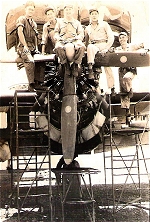
Enders, Ondrik, Merrill,
Kennedy, Unknown
|
Shortly after he got there, they were all in the Red Cross building watching a movie one night when they got an air raid warning. Everyone bailed out and headed for the trenches. The trenches were filled with water from the recent rains. Should have heard the guys holler when they hit the cold muddy water.
Kennedy was an American Indian from Oklahoma. MP's would assign John the task of taking care of Kennedy when he would be brought back to his barracks after a night out on the town.
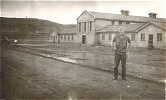
John in front of the
Red Cross and Theater Building
|
They first lived in tents when they got there and then were moved into barracks on the side of the mountain, the runway was down below. Had stoves which burned charcoal in the winter, weather was similar to central Texas.
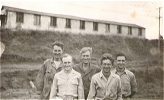
Anderson, Marvin Merrill,
Enders, Trieber, Charlie Fink
|
The base had a mess hall and the food was not too bad. Everyone took turns at KP duty. Water was trucked in so showers were at a premium. Once John and Trieber filled a barrel with muddy water from a Chinese sistern. Nevermind the condition of the water, just getting a bath was worth it.
Trieber was from New Jersey. He once made an unauthorized trip in an unauthorized vehicle. John covered for him. Don't know where he went but after a couple weeks, when his leave was over, he returned and no one ever knew.
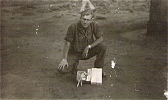
John with monthly rations for July
|
Each month they got a small box of rations but there was precious little in the way of treats. The big treat came from the states and specifically from his sister Louise and her young daughter Shirley. They would meticulously wrap up individual 6-oz glass bottles of Coca Cola to safely make the long trip to China. To chill the Cokes, they would place them under the airplane fuel tanks where the fuel would drip over them and quickly cool them down. It was always a day of celebration when they came and you could share them with your best friends.
There was a little R&R occasionally. Once he went out on a small boat on a nearby lake and even though the sky was very cloudy, he got the worst sunburn of his life. That was a lesson he never forgot and impressed it upon his children.
He found out, too, that his cousin was at Kunming, so on an off-day he and a friend hopped a truck to the headquarters there. With a little effort he was able to locate his office. He told the officer in charge that he wanted to see Lt. Col. Frank Newnam, Jr. The officer asked back for the reason, John replied, "I just want to see him cause he's my cousin." The officer said wait right there. He could hear his cousin's voice say, "Well, tell that boy to get on in here." They had a very good reunion. Frank asked if they would like a cup of coffee, the friend replied that he would. Col. Newnam told a private to fix 3 cups of coffee. John figured if a private was going to wait on him, he was gonna drink the coffee (he has always had an intense dislike for coffee). He met Col. Newnam once more in Kunming at the USO.
MONGOLIA
John never had basic training, strange as that was. Once a commanding officer called him into his office and said, "I notice on your records that you've never had basic training. Why is that?" John replied, "I don't know, sir, I never asked." The CO replied, "I don't blame you. I'll just mark your file complete." But it was at Chenkung that they discovered that he had had extensive experience as a propeller specialist in San Antonio before joining the Air Force. It seems that a C-47 had run out of gas and crashed in a riverbed in Mongolia. The plane was carrying a full load of gasoline barrels and the propellers were now tied up in a corkscrew knot.
The plan was to bring in a crew from Chenkung to repair the props and have the locals build a roadbed in the riverbed so the plane could take off. They selected John, two privates and a sergeant to go along with two Chinese interpreters to the crash site in Mongolia. So they gathered up their tools and new propellers and took a plane from Chenkung in Southern China to the farthest fighter base north. From there they loaded everything on the back of a truck and spent 4 days traveling on the worst roads possible. Gasoline trucks were not used in most of China, but these trucks were Russian made, right hand drive, and ran on alcohol or gas from charcoal, which was easily obtained along the way. They spent nights in hostels along the way. Each day they shot a plentiful supply of pheasants from the back of the truck and the Chinese would have them cooked every night for supper.
"When we got to the riverbed, we uncrated the props and realized that the wrong ones had been sent so we had to phone back to the fighter base and have them get the correct propellers from Chenkung. The little Mongolian town had one phone, they didn't want to use the plane's radio for fear of running down the battery. It took an hour to get the phone call through, the Chinese interpreters got on the phone and yelled, 'Wah! Wah! Wah' (later to find out that meant hello). Everyone knew who we were and where we were. The parts were put on smaller planes and flown in to the riverbed runway which was complete by then.
"One day in our room while waiting for the parts, we were all sitting around talking when there was a knock on the door. I opened it to find Japanese soldiers aiming their weapons at me. I slammed the door, yelled, 'JAPS!', and dove through the wood-slat window and began to hightail it down the road. I noticed that the locals were laughing and signaling for me to go back. So I stopped and noticed that nobody was following. When I got back to the room, I discovered that the Japs were actually Chinese soldiers who were looking for two Chinese deserters. They'd been told that there were two Chinese with us (our interpreters). “I survived the 'attack' but it took a long time to get over the razzing I had to take from the rest of the guys.
"We put the props on only to realize that one was missing the rubber gasket which was around the prop dome which sealed it from leaking oil. Trying to figure out what we were going to use in place of the gasket, I noticed that the guy sitting next to me had his knife strapped to his leg with a leather thong that held it to his thigh. I told him, 'I want that leather strap.'
"He took it off and I sat there and beat it out with a hammer and got it to where I could press it down into the prop hub and I could screw the dome back on. We started the engines up, the props worked okay. We called the crew in, they got in it and took off with the engine screaming. It got back to the base at Chenkung okay and showed signs of beginning to leak oil just as they landed.
"We had filled their tanks with the gasoline they had on board so they could run light. What they didn't take in the tanks, we tried to give away to the Mongolians (they were afraid of gasoline and didn't want it) so we loaded as many barrels as we could on our truck and headed back to the base, shooting pheasants along the way."
Only later did they find out that pheasants were sacred. All in all, it took 2 weeks to repair the plane plus traveling time"
THE SCOOTER
As part of the ground crew, John got tired to walking from one end of the runway to the other, so he built himself a scooter, termed by him as the most fun he had over there. The front wheel was the tail wheel off a small airplane, the frame was made from some tubing on hand, with a makeshift handlebar and seat, and the rear wheel was off a wheelbarrow. He freed-up an engine from the motor pool and adapted a belt drive. Back and forth he'd go all day long, nobody ever said anything to him about it. They just laughed. It was still there and running strong when the War was over.
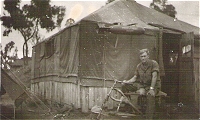
John and his scooter
|
Sometime after Thanksgiving of 1945, they got their orders to depart. They traveled the 17 miles to
Kunming, China
and flew out to
Calcutta, India.
In Calcutta, they took a troop ship to Tacoma, Washington, by way of
Singapore,
Japan,
Aleutian Islands,
Tacoma, Washington
It took 10 days. In Tacoma Washington, they loaded onto a train for
Fort Bliss, El Paso, Texas
There they waited in a tent for their discharge papers for 3 or 4 days. Nothing. Then he and 3 other sergeants went to the CO of their squadron inquiring about the delay. He said he didn't know anything. He gave them permission to go to the CO of the base. He said he didn't have an answer. They wanted to know what the penalty would be if they went AWOL and then returned in a week. He said he'd probably just confine them to their tent for a week. The CO asked each one of them why they were in such a hurry to get their discharge. John told him, he had a wife and a little daughter and it had been a very long time since he had seen them. Then the CO said, well can you wait until 5:00 p.m.? They said yes and he said he'd have it all worked out.
At 5:00, the CO’s office released a list of people who could go get their papers, their names were the first 4. They ran to get it. One friend found a Bureau car that had just come in from Texarkana. The driver said he was too tired to drive. The four of them volunteered to drive and it was agreed. Driving all night, they reached
San Antonio, Texas
about daybreak. John caught a bus from San Antonio and reached
Austin, Texas
at 11:00 a.m. on December 24, 1945. Merry Christmas!
LINKS
Military Brochure of History of Chinese Defensive
Photos of P-61 at Chenkung Feb 1945
Christmas in C-B-I Theater
Current photos (6) of Chenkung (now Chenggong) near the bottom
Narration of time and area
Narration of Wallace Douglas Culps
You are Visitor Number
|
|